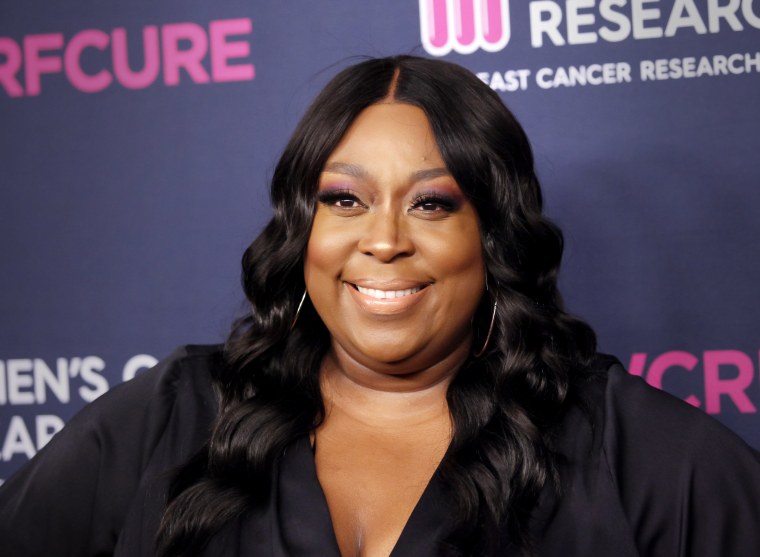Loni Love has always seemed relatively unfiltered; as a host on "The Real," she's spoken openly about some personal topics, including body image, sex and her miscarriage. And yet, even devout fans of the show will come to find that there's so much more to the comedian they didn't know about until they read her memoir, "I Tried to Change So You Don't Have To."
"I wanted to let people actually know my story," Love, who collaborated on the memoir with Jeannine Amber, told NBC News. "This is the best way to let people know who I am, what I'm about, how I grew up and the lessons that I've learned along the way to becoming an Emmy award-winning talk show host."
So who is Loni Love? As she writes in the book, which was released Tuesday, Love didn't get to Hollywood the way a lot of other people do. She was born in Detroit in 1971 and was raised in the Brewster-Douglass Housing Projects, until her mother kicked her out as a teenager. Love took a job as an assembly-line worker at General Motors' Detroit-Hamtramck plant and lived out of her car — a period she details in full throughout the first few chapters of "I Tried to Change So You Don't Have To." These chapters, she said, were the "most difficult" to write.
"I had to go through a period of homelessness. I had to go through dealing with the crack era," Love said. "These moments were hard to relive, but you have to relive it to create a story, so I relived them, and I got through it."
Love seeks to endow her readers with that same sense of resilience, which is why the memoir is centered on "true life lessons." Every chapter includes a section offering — sometimes more hilarious than practical — advice, including "update your résumé" and find out whether the office vending machine has Skittles before you accept a job.
Things turned around when Love encountered an engineer at the GM plant, a man who had also grown up in the Brewster-Douglass Housing Projects named Mr. Arnold. Arnold encouraged her to apply to Prairie View A&M University, a historically Black school in Texas. He was the first person who'd ever spoken to Love about college.
While Love came into her own at Prairie View, where she earned a degree in electrical engineering and discovered her penchant for performance, she also experienced racial discrimination at the hands of the police, culminating in her getting arrested for "trespassing" at a fast-food joint after her friend filled a water cup with soda.
"For me, I didn't feel racism slap me in the face until the night that power-tripping white police officer threw my a-- in jail," Love writes in "I Tried to Change So You Don't Have To." "Of course, growing up, the effects of racism were all around me — racism is how Detroit got its segregated housing, underfunded public schools and overaggressive cops — but as a kid, I didn't feel personally attacked. … For my whole life I'd only ever been judged as a complete person — based on my behavior, accomplishments, or character — and never solely because of my race."
While the trespassing charge was dropped, Love's arrest marked a turning point in that she learned how much differently some would treat her because she's Black. In a subsequent encounter, a comedy instructor urged her to focus her routines on crack, instead of her experiences working as an engineer for Xerox, as she believed Love would appear more "unique and authentic" if she did so.
Although she no longer works as an engineer, Love said she tries to be a mentor to young women in STEM because she knows what it's like to be all alone in an industry in which Black women are vastly underrepresented. She recalled a Monday morning meeting when she and her colleagues went around the room to share what they'd done the previous weekend. After all her colleagues said they had spent time with their families, she responded that she'd gone to a Snoop Dogg concert.
"When I was an engineer for eight years, it was a very lonely time. It was a culture shock, because I was placed in a group that was predominantly older white males," Love said. "When you're trying to diversify something, you don't have mentors. I had a bunch of men who didn't understand me, and I didn't understand them."
Even if you're not an engineer, however, Love has some guidance for you. As widespread protests against racial injustice continue after the death of George Floyd, Love said she's urging her friends to take time for themselves.
"I check on my so-called strong friends. I encourage them to take some time away from the news and protesting," Love said. "You keep fighting, but also, this is your life, and you still need to take some time. … People that aren't in this don't understand the fight. It's exhausting trying to explain it to people who don't understand, so all you can do is what you can do, but there has to be balance."
The book's greatest lesson is hiding in plain sight, according to Love, who hopes readers will internalize its title.
"I hope they listen to the title, because the whole purpose of 'I Tried to Change So You Don't Have To' is to give you life lessons," Love said. "You're OK just the way you are. You can change your flaws or embrace your flaws, but either way, that doesn't mean you're not an important person in this country, that you don't have rights in this country, that you can't have a good life in this country."
